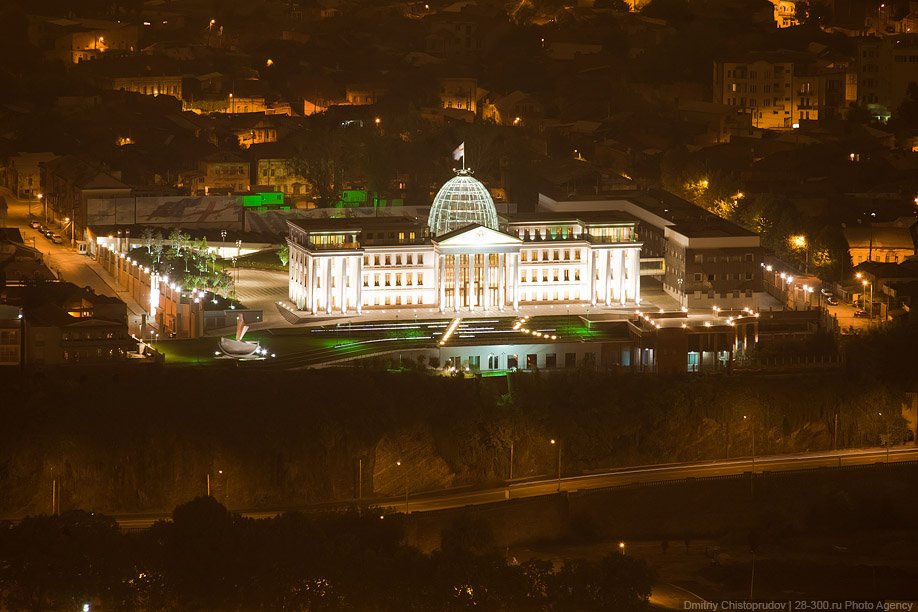The former Prime Minister, founder of the ruling 'Georgian Dream' coalition, the billionaire Bidzina Ivanishvili, again criticized President George Margvelashvili for not wishing to leave the Avlabari Palace – a magnificent building, which is a few dozen square meters bigger than the White House in Washington, and which was built by ex-president of Georgia Mikheil Saakashvili using 'donations from Georgian businessmen'.
How voluntary those contributions were is another question, but Bidzina Ivanishvili wasn't among those donors for sure. Since the early 2000s he has spent more than a billion dollars, which is one-fifth of his private means, on charity, construction of churches and restoration of historic buildings, as well as payment of monthly pensions to Honored Masters of Art.
Despite the difference of characters and mentalities, Ivanishvili and Saakashvili have one thing in common – a passion for architecture. Ivanishvili has often said that the former president "knows nothing about architecture" and has built "a lot of ugly buildings" all over the country. Apparently, he considers the Avlabar Palace, which overlooks the capital city in the Avlabari district, as one of these "monsters".
But not everyone likes Ivanishvili's glass palace, which looms over Tbilisi from Mount Tabor. But Ivanishvili's repeated demands to the president to leave the Avlabar Palace are not only due to subtleties of architectural taste.

The Glass Palace
The Avlabar Palace is an architectural symbol of Mikheil Saakashvili's rule. Until his victory in the election, Margvelashvili had repeatedly called it "a nest of debauchery", alluding to the numerous gossip and rumors, promising to hand it over to the new university, probably referring to consecration of the building.
But immediately after his election, Margvelashvili suddenly changed his mind and moved to the Avlabar Palace, explaining it was due to the need to "strengthen the institution of the presidency." The president hinted that staying in "two rooms of the State Chancellery building" cramps his prestige as the head of state, although the former building of the US embassy on Atoneli Street in the city center was restored for this purpose.
In 1992, when the Georgian authorities were thinking about a residence for the embassy of the friendly superpower, they chose one of the best buildings in the city. But it doesn't suit the president - the courtyard is too small for organizing ceremonial events. In addition, the building is sandwiched between two taller buildings, being their continuation.
According to the new Georgian constitution, the president has only symbolic functions, and the real powers in the country (the Prime Minister and Ivanishvili) thought that the head of state does not need to perform representative functions any more. Moreover, the interior of the 'small palace' is tastefully and skillfully decorated.
However, the president's power was enough to demand the keys to the Avlabari Palace from the economic department of the administration and move there. This disobedience would have disturbed Ivanishvili, who played a decisive role in the election of President Margvelashvili. If he hadn't chosen him, Margvelashvili would never be president. A Georgian sociologist recently said: "If in 2012, i.e. before Ivanishvili's statement about his choice, you would have stopped a hundred people on the street and asked to name ten potential presidential candidates, none of them would name Giorgi Margvelashvili. But he won the presidential elections in the first round out of respect for the leader of the ruling coalition and generous philanthropist."
Over time, the billionaire's statements on the need to "leave the building" have been becoming more categorical, and recently he even said words, which many considered to be a red line, after which a compromise is no longer possible: "The President has to leave the palace, whether he likes it or not!"
Ivanishvili motivated his demand by the information that the upkeep of the huge palace costs taxpayers $5 million per year. For poor Georgia it is a considerable sum. The Minister of Economy and Sustainable Development, Dmitry Kumsishvili, noted another argument – the repair of the 'small palace' on Atoneli Street cost $15 million and maintaining it in the proper condition costs a lot of money too. "The building is empty! Has it turned out that the budget money was spent aimlessly?" the head of the Economy Ministry rhetorically asked.

The presidential administration said that Margvelashvili has settled in the Avlabari Palace and "does not intend to change his workplace."
That is, the position of the head of state is no less categorical. The fact that after all the tough statements, the retreat of one of the sides will be perceived as a defeat by society, makes the situation a bit funny. This is disadvantageous for the ruling coalition on the eve of the parliamentary elections in 2016, so the government will do everything to make the president change his mind.
According to the law, the Cabinet determines the specific place where the head of state lives and works, not the President himself. So the president is breaking the law. No one will expel him from his residence by force. But the government has many other levers: the Finance Ministry pays salaries to the administrative staff, the government departments provide the palace with all the necessary amenities, including electricity and water.
The near future will show whether President Giorgi Margvelashvili will turn into a King Charles I, who was surrounded by the parliament in his own palace.






